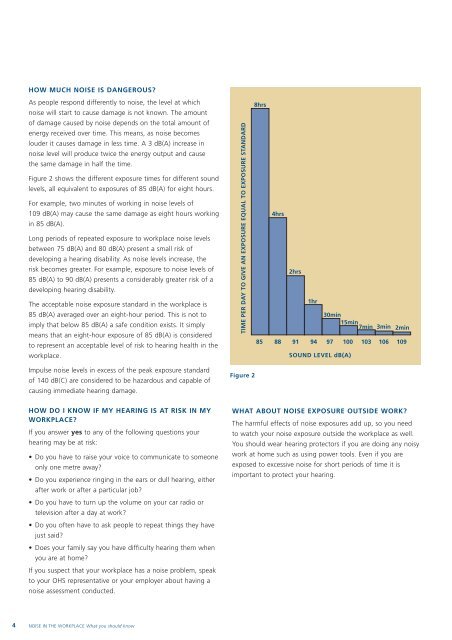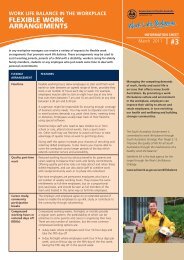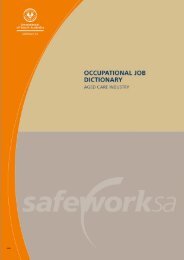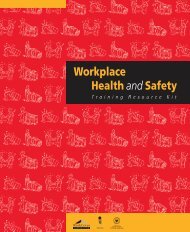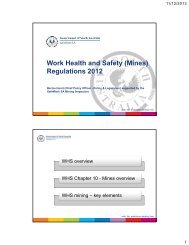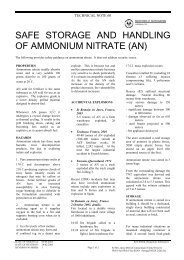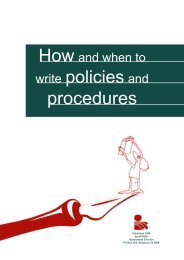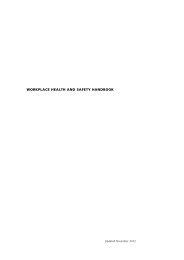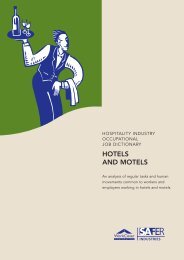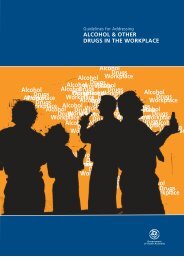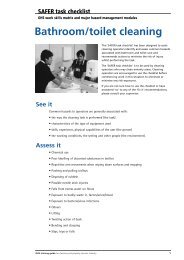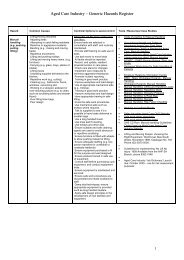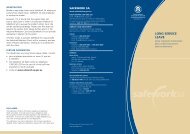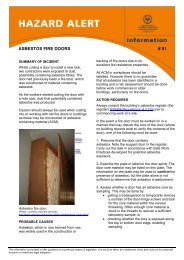NOISE IN THE WORKPLACE - SafeWork SA
NOISE IN THE WORKPLACE - SafeWork SA
NOISE IN THE WORKPLACE - SafeWork SA
You also want an ePaper? Increase the reach of your titles
YUMPU automatically turns print PDFs into web optimized ePapers that Google loves.
4<br />
HOW MUCH <strong>NOISE</strong> IS DANGEROUS?<br />
As people respond differently to noise, the level at which<br />
noise will start to cause damage is not known. The amount<br />
of damage caused by noise depends on the total amount of<br />
energy received over time. This means, as noise becomes<br />
louder it causes damage in less time. A 3 dB(A) increase in<br />
noise level will produce twice the energy output and cause<br />
the same damage in half the time.<br />
Figure 2 shows the different exposure times for different sound<br />
levels, all equivalent to exposures of 85 dB(A) for eight hours.<br />
For example, two minutes of working in noise levels of<br />
109 dB(A) may cause the same damage as eight hours working<br />
in 85 dB(A).<br />
Long periods of repeated exposure to workplace noise levels<br />
between 75 dB(A) and 80 dB(A) present a small risk of<br />
developing a hearing disability. As noise levels increase, the<br />
risk becomes greater. For example, exposure to noise levels of<br />
85 dB(A) to 90 dB(A) presents a considerably greater risk of a<br />
developing hearing disability.<br />
The acceptable noise exposure standard in the workplace is<br />
85 dB(A) averaged over an eight-hour period. This is not to<br />
imply that below 85 dB(A) a safe condition exists. It simply<br />
means that an eight-hour exposure of 85 dB(A) is considered<br />
to represent an acceptable level of risk to hearing health in the<br />
workplace.<br />
Impulse noise levels in excess of the peak exposure standard<br />
of 140 dB(C) are considered to be hazardous and capable of<br />
causing immediate hearing damage.<br />
HOW DO I KNOW IF MY HEAR<strong>IN</strong>G IS AT RISK <strong>IN</strong> MY<br />
<strong>WORKPLACE</strong>?<br />
If you answer yes to any of the following questions your<br />
hearing may be at risk:<br />
Do you have to raise your voice to communicate to someone<br />
only one metre away?<br />
Do you experience ringing in the ears or dull hearing, either<br />
after work or after a particular job?<br />
Do you have to turn up the volume on your car radio or<br />
television after a day at work?<br />
Do you often have to ask people to repeat things they have<br />
just said?<br />
Does your family say you have difficulty hearing them when<br />
you are at home?<br />
If you suspect that your workplace has a noise problem, speak<br />
to your OHS representative or your employer about having a<br />
noise assessment conducted.<br />
<strong>NOISE</strong> <strong>IN</strong> <strong>THE</strong> <strong>WORKPLACE</strong> What you should know<br />
WHAT ABOUT <strong>NOISE</strong> EXPOSURE OUTSIDE WORK?<br />
The harmful effects of noise exposures add up, so you need<br />
to watch your noise exposure outside the workplace as well.<br />
You should wear hearing protectors if you are doing any noisy<br />
work at home such as using power tools. Even if you are<br />
exposed to excessive noise for short periods of time it is<br />
important to protect your hearing.


